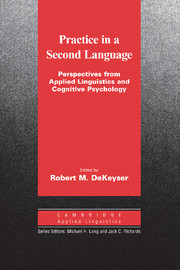Book contents
- Frontmatter
- Contents
- List of contributors
- Series editors' preface
- Introduction: Situating the concept of practice
- I: FOUNDATIONS
- II: INSTITUTIONAL CONTEXTS
- Chapter 5 A cognitive approach to improving immersion students' oral language abilities: The Awareness-Practice-Feedback sequence
- Chapter 6 Second language education: Practice in perfect learning conditions?
- Chapter 7 Meaningful L2 practice in foreign language classrooms: A cognitive-interactionist SLA perspective
- Chapter 8 Study abroad as foreign language practice
- III: INDIVIDUAL DIFFERENCES
- Conclusion: The future of practice
- Glossary
- Index
- References
Chapter 8 - Study abroad as foreign language practice
Published online by Cambridge University Press: 27 January 2010
- Frontmatter
- Contents
- List of contributors
- Series editors' preface
- Introduction: Situating the concept of practice
- I: FOUNDATIONS
- II: INSTITUTIONAL CONTEXTS
- Chapter 5 A cognitive approach to improving immersion students' oral language abilities: The Awareness-Practice-Feedback sequence
- Chapter 6 Second language education: Practice in perfect learning conditions?
- Chapter 7 Meaningful L2 practice in foreign language classrooms: A cognitive-interactionist SLA perspective
- Chapter 8 Study abroad as foreign language practice
- III: INDIVIDUAL DIFFERENCES
- Conclusion: The future of practice
- Glossary
- Index
- References
Summary
A semester abroad is often seen as the ultimate opportunity to practice a foreign language, in terms of both quantity and quality of input and interaction. For some students, parents, teachers, administrators, and prospective employers, study abroad is not only the best form of practice, sometimes it is the only form they consider to be useful. Yet, the literature shows that many students come back from abroad with a certain level of disappointment about their progress, and that even those who feel that they made substantial progress have not improved much on objective measures, especially with respect to accuracy. This chapter describes how students typically practice their language skills abroad and how this influences their proficiency gains. It then compares this typical practice abroad with what SLA theory and the relevant literature in cognitive psychology, specifically skill acquisition theory, have to say about good practice. Finally it argues that the linguistic benefits of study abroad could be greatly enhanced by planning systematically for a continuum of practice from basic classroom instruction to pre-departure training, on-site observation and guidance, and courses for students returning home.
What is typically achieved as a result of study abroad?
This first section provides an assessment of what progress is typically made in the four skills during study abroad. A few studies report on various skills; they will be discussed here first. Research focusing more narrowly on one or two skills will be dealt with next.
- Type
- Chapter
- Information
- Practice in a Second LanguagePerspectives from Applied Linguistics and Cognitive Psychology, pp. 208 - 226Publisher: Cambridge University PressPrint publication year: 2007
References
- 106
- Cited by

